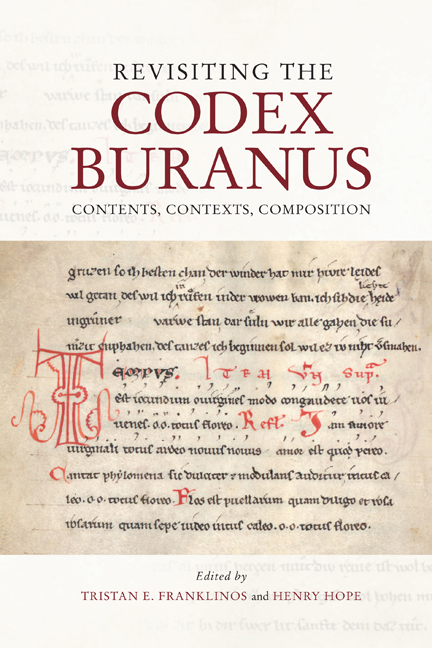Book contents
- Frontmatter
- Contents
- List of Illustrations
- Acknowledgements
- Abbreviations
- Dedication
- Introduction: The Codex Buranus – A Unique Challenge
- Chapter 1 A Modern Reception History of the Codex Buranus in Image and Sound
- Chapter 2 Parody in the Codex Buranus
- Chapter 3 Satire in the Codex Buranus
- Chapter 4 ‘Artes Amatorie Iam Non Instruuntur’: Learned and Erotic Discourse in the Carmina Burana
- Chapter 5 Classical Learning and Audience in the Carmina Amatoria: A Case-Study on CB 92
- Chapter 6 Rape, the Pastourelle, and the Female Voice in CB 185
- Chapter 7 Rethinking the Carmina Burana III: The Poetry of Peasants
- Chapter 8 Predestination and God’s Grace: The Salvific Architecture of the Religious Songs in the Codex Buranus
- Chapter 9 Revisiting the Plays of the Codex Buranus
- Chapter 10 Revisiting the Music of the Codex Buranus
- Chapter 11 Locating the Codex Buranus: Notational Contexts
- Chapter 12 Plurilingualism in the Codex Buranus: An Intercultural Reconsideration
- Chapter 13 Compilation, Contrafacture, Composition: Revisiting the German Texts of the Codex Buranus
- Afterword: multiformis armonia, scolaris symphonia
- List of Manuscripts
- Bibliography
- Index
- General Index
- Studies in Medieval and Renaissance Music
Chapter 1 - A Modern Reception History of the Codex Buranus in Image and Sound
Published online by Cambridge University Press: 16 September 2020
- Frontmatter
- Contents
- List of Illustrations
- Acknowledgements
- Abbreviations
- Dedication
- Introduction: The Codex Buranus – A Unique Challenge
- Chapter 1 A Modern Reception History of the Codex Buranus in Image and Sound
- Chapter 2 Parody in the Codex Buranus
- Chapter 3 Satire in the Codex Buranus
- Chapter 4 ‘Artes Amatorie Iam Non Instruuntur’: Learned and Erotic Discourse in the Carmina Burana
- Chapter 5 Classical Learning and Audience in the Carmina Amatoria: A Case-Study on CB 92
- Chapter 6 Rape, the Pastourelle, and the Female Voice in CB 185
- Chapter 7 Rethinking the Carmina Burana III: The Poetry of Peasants
- Chapter 8 Predestination and God’s Grace: The Salvific Architecture of the Religious Songs in the Codex Buranus
- Chapter 9 Revisiting the Plays of the Codex Buranus
- Chapter 10 Revisiting the Music of the Codex Buranus
- Chapter 11 Locating the Codex Buranus: Notational Contexts
- Chapter 12 Plurilingualism in the Codex Buranus: An Intercultural Reconsideration
- Chapter 13 Compilation, Contrafacture, Composition: Revisiting the German Texts of the Codex Buranus
- Afterword: multiformis armonia, scolaris symphonia
- List of Manuscripts
- Bibliography
- Index
- General Index
- Studies in Medieval and Renaissance Music
Summary
Since its discovery in 1803, the Codex Buranus – the largest medieval collection of secular songs in Latin – has won the attention of scholars from philology, literature, history, and musicology, and has captured the imaginations of musicians from contemporary art music through historically informed performance to rock music. Songs from the manuscript have been performed by many leading medieval music ensembles, from the Studio der Fruhen Musik's and New London Consort's imaginative and lively instrumental accompaniments to the beautiful a cappella renditions of Ensemble Organum. In 2008, Sequentia performed a selection of songs from the codex in the first half of a programme that also featured Carl Orff 's 1937 Carmina Burana, inviting listeners to draw connections between Orff 's chosen texts, the various metres and forms of the poetry, and musical treatments best poised to illuminate them. Songs from the manuscript have also made an impact in popular music circles, for instance with electronic music groups Helium Vola and Qntal, or heavy metal and pagan metal bands such as Theatre of Tragedy, In Extremo, and Faun. The most extensive of these forays is the work of the German medieval metal band Corvus Corax, who shaped several of the manuscript's songs into an opera that premiered with great aplomb at Berlin's Museumsinsel in 2005. To have so many of its songs known outside the circle of medieval music scholarship is quite a feat for a codex that contains notation for no more than a sixth of its repertoire.
This chapter offers a reception history of some of the musical reconstructions of songs from the Codex Buranus, focussing on three areas: Orff 's Carmina Burana; performances and reconstructions by medieval music ensembles; and songs performed and composed by bands in the popular music category. These renditions reveal a significant overlap in approach to their material which results, in part, from the static nature of the medieval transmission as well as the shared backgrounds of the musicians and directors. Although there is a wide range of engagement with the songs, the preference for particular themes in the manuscript's repertoire over others suggests a public that is drawn to dichotomies between institutionalised and alternative culture, sacred and secular, reality and the imagined.
- Type
- Chapter
- Information
- Revisiting the Codex BuranusContents, Contexts, Compositions, pp. 13 - 38Publisher: Boydell & BrewerPrint publication year: 2020



